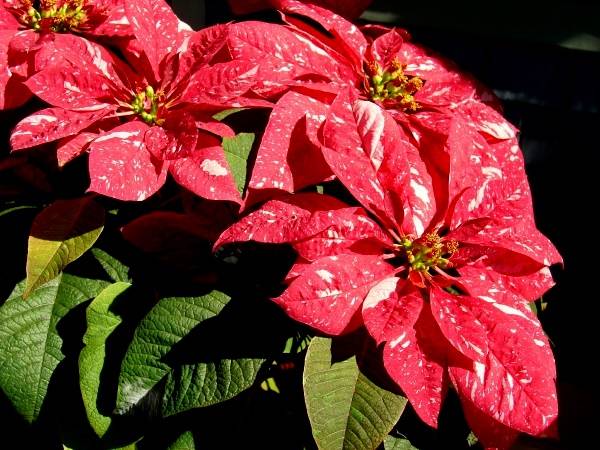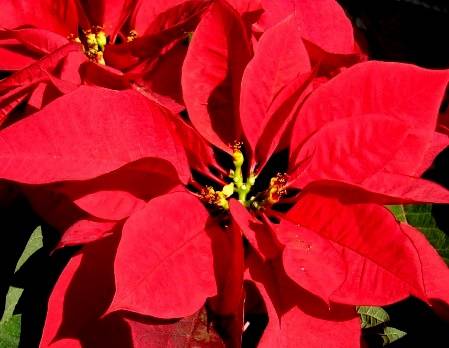Larry asks: I kept my Christmas poinsettia plant alive in hopes I could save it for next winter. Most of the flowers have faded but the plant seems to be still alive. Any tips for saving this plant or propagating
Larry asks: I kept my Christmas poinsettia plant alive in hopes I could save it for next winter. Most of the flowers have faded but the plant seems to be still alive. Any tips for saving this plant or propagating new ones from it?
Tropical Gardener answer: You can maintain your poinsettia (Euphorbia pulcherrima) between winter blooming periods and you can also take cuttings to propagate new plants that will bloom next winter. If you have an unusual variety, you might want to check to see if it is patent protected. In that case it may be hard to propagate and, if you succeed, you can be sued if you try to sell it.
This late in the spring most poinsettia blooms will likely have faded. Once the blooms have faded fully, remove them completely by cutting back to a lower bud and decrease the watering, allowing the plant to dry out a bit but not completely. This pruning should encourage new growth. When the new growth appears, begin light watering again. When the new growth is between 6 and 10 inches long, pinch the tips to encourage lower branching. This can be done once a month until the middle of August. Be sure to wear gloves when handling poinsettias to avoid any allergic reaction to their milky sap.
If you want to propagate from cuttings as well, you can remove some of the new growth once it reaches 4 inches long and has a few mature leaves. Strip off the lowest leaves to expose a growth node and apply rooting hormones to the cut end. Put the cuttings in a mix that holds some moisture but drains well. Perlite mixed half and half with vermiculite is a good choice. Place the cuttings out of direct sunlight in a bright location and mist them daily to keep the leaves hydrated and cool. You can also place a plastic bag over the pot to maintain humidity. Avoid letting the soil get too wet, which can cause root rot or other diseases.
Within a month, the cuttings should have a root system started. Once they have a healthy root system, you can put them in a larger pot with potting soil and fertilize lightly with nitrogen and potassium. Once they start putting out new leaves you can move them into the garden if you wish. For best results, choose a lightly shaded area with indirect sunlight and moist, fast-draining soil rich in organic matter.
To encourage flowering next winter, begin to reduce the plant’s exposure to daylight in late September. You can cover them with boxes at night so that they are in darkness for 12 hours every day. The plants should get plenty of light during the day, however, to gather energy for flowering. Once blooming begins a semi-cool, humid location in a bright spot with indirect light and a bit more water should result in a healthy plant with vibrant blossoms in December.
Email plant questions to konamg@ctahr.hawaii.edu for answers by Certified Master Gardeners. Some questions will be chosen for inclusion in this column.
Diana Duff is a plant adviser, educator and consultant living in a dryland forest north of Kailua-Kona.
Gardening Events
Sunday-Sunday: “Ka’u Coffee Festival,” annual festival celebrating award-winning Ka‘u coffee from May 19 to 28. All-day, free hoolaulea on May 27 at Pahala Community Center. For more information, visit www.kaucoffeefest.com.
Farmer Direct Markets
Wednesday: “Sunset Farmers Market,” 2 p.m. to sunset at the north makai corner of the Kmart parking lot.
Wednesday and Friday: “Hooulu Farmers Market,” 9 a.m. to 2 p.m. at Sheraton Kona Resort &Spa at Keauhou Bay
Friday: “Pure Kona Market,” 9 a.m. to 5 p.m. at Amy Greenwell Garden in Captain Cook
Saturday: “Keauhou Farmers Market,” 8 a.m. to noon at Keauhou Shopping Center
“Kamuela Farmer’s Market,” 7 a.m. to noon at Pukalani Stables
Sunday: “Pure Kona Green Market,” 9 a.m. to 2 p.m. at Amy Greenwell Garden in Captain Cook
Tuesday through Saturday: “U-Pick greens and produce,” 10a.m. to 4p.m. Tropical Edibles Nursery, Captain Cook.
Plant Advice Lines
Anytime: konamg@ctahr.hawaii.edu
Tuesdays and Thursdays: 9 a.m. to noon at UH-CES in Kainaliu, 322-4892
Mondays, Tuesdays and Fridays: 9 a.m. to noon at UH-CES at Komohana in Hilo, 981-5199 or himga@hawaii.edu




